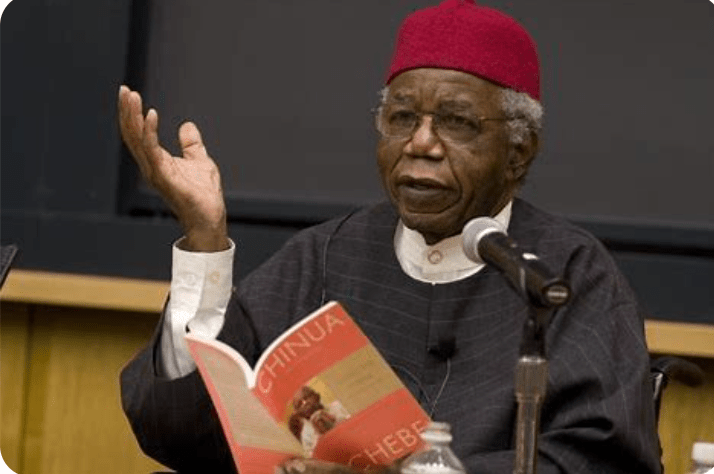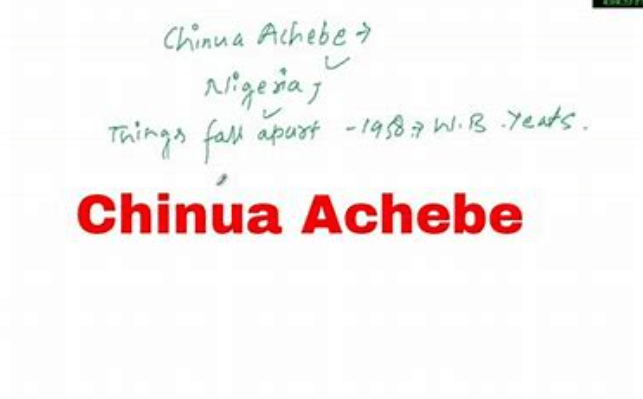Exploring 6 Best Chinua Achebe Books: The Mystery Behind his creation!

Chinua Achebe is such an incredible figure in African literature. He changed our thoughts about the continent by telling these amazing stories and sharing his deep insights. His works stood out, illuminating the diverse and fascinating African culture, history, and identity that often gets overlooked in Western narratives. Let’s look at a quick scan of the best Chinua Achebe books.
Table of Contents
Toggle
Explore also a comprehensive guide about famous African novels
Chinua Achebe biography: A Quick Scan
Chinua Achebe was a Nigerian novelist, poet, and critic. He lived from 1930 to 2013(83 Years). Achebe is known as a key figure in modern African literature. He was born in Ogidi, Nigeria. He studied English, history, and theology at University College Ibadan. Achebe’s first novel, Things Fall Apart, published in 1958, is seen as the most popular and studied African novel.
His works, known as “The African Trilogy,” explore the impact of colonialism. They highlight the conflict between traditional African values and Western influences very well. Yes, Achebe made important contributions to the African Writers Series. He also held a director position at the Nigerian Broadcasting Corporation. He died on March 21, 2013, in Boston, Massachusetts.
Chinua Achebe’s Major Works
| Category | Title | Year | Notes |
| Novels | Things Fall Apart | 1958 | Achebe’s debut novel; a seminal work in African literature. |
| No Longer at Ease | 1960 | Explores the challenges of post-colonial identity. | |
| Arrow of God | 1964 | Part of “The African Trilogy”, details of the conflict between tradition and colonialism. | |
| A Man of the People | 1966 | A satirical novel critiquing political corruption. | |
| Anthills of the Savannah | 1987 | Final novel examines post-colonial African politics. | |
| Children’s Books | Chike and the River | 1966 | Part of “The African Trilogy”, delves into the conflict between tradition and colonialism. |
| Short Story Collections | The Sacrificial Egg and Other Stories | 1953 | A collection of short stories. |
| Girls at War and Other Stories | 1973 | Explores themes of war and its effects on society. | |
| Poetry | Beware, Soul Brother | 1971 | A volume of poetry. |
| Collected Poems | 2004 | A comprehensive collection of his poems. | |
| Essays | Morning Yet on Creation Day | 1975 | A collection of essays. |
| Hopes and Impediments | 1990 | Further essays on African issues. | |
| Home and Exile | 2000 | Reflects on his experiences and thoughts on exile. | |
| The Education of a British-Protected Child | 2012 | A collection of essays. | |
| Memoir | There Was a Country: A Personal History of Biafra | 2012 | A personal account of the Nigerian Civil War. |
Chinua Achebe’s significant Maiden work
Oh, have you heard about his excellent first book, “Things Fall Apart”? It changed the way people saw African societies. Moreover, it showed everyone just how intricate and rich African life is. Achebe’s writings are something special. He combined traditional oral storytelling with modern literary techniques, making his work stand out. And it wasn’t just about questioning the colonial legacy but also about capturing the essence of postcolonial African life. Wow, his impact goes way beyond just literature! He’s greatly influenced African identity, politics, and how the world sees African cultures.
Background of Chinua Achebe
A. Brief biography of Chinua Achebe

Chinua Achebe, born Albert Chinụalụmọgụ Achebe on November 16, 1930, in Ogidi, a large village in Eastern Nigeria, emerged as a seminal figure in modern African literature. His father, Isaiah Okafor Achebe, was a teacher and evangelist. At the same time, his mother, Janet Anaenechi Iloegbunam, was a leader among church women and a vegetable farmer.
Both Igbo traditional culture and postcolonial Christianity had a significant role in shaping Achebe’s unique literary voice during his upbringing. His writing effortlessly combined African traditions with modern themes, creating a captivating blend.
Achebe started his education at St Philip’s Central School in Ogidi, where he was known for his intelligence and reading abilities. He later got to go to the well-known Government College, Umuahia, for his secondary education.
This period was crucial in shaping his life, allowing him to understand the cultural and religious aspects of his surroundings deeply.
In 1948, Achebe initially enrolled in Nigeria’s first university, University College (now the University of Ibadan), to study medicine. However, his exposure to Western literature, particularly its portrayal of Africa, deeply affected him. His experience with Joyce Cary’s “Mister Johnson” significantly influenced his decision to switch from studying medicine to pursuing English, history, and theology. Even though this change meant losing his scholarship, he had the full support of his family.
Achebe’s literary career began at the University of Ibadan, where he wrote for the University Herald. His writings, which included essays, letters, and his first short story, “In a Village Church,” revealed his early exploration of the conflicts between tradition and modernity and the synthesis of Igbo life with Christian influences.
After university, Achebe taught for a short time in Oba. In 1954, he moved to Lagos to work for the Nigerian Broadcasting Service (NBS), where he learned how to write scripts and tell stories, which were very important to his later success as a writer.
His time at NBS also began his prolific writing career, writing his first and most celebrated novel, “Things Fall Apart” (1958). This novel, along with “No Longer at Ease” (1960) and “Arrow of God” (1964), forms what is known as the “African Trilogy,” a series that offers a profound insight into African society and its complex interaction with colonial influences.
Achebe’s later novels, such as “A Man of the People” (1966) and “Anthills of the Savannah” (1987), stand out for their examination of life after colonial rule, the conflict between different cultures, and what it means to be African. Achebe advocated for using English in African literature to reach more readers. He was known for critiquing Western portrayals of Africa, especially in his 1975 lecture “An Image of Africa: Racism in Conrad’s Heart of Darkness.” This stance made him a critical voice in discussions about postcolonialism.
Chinua Achebe’s impact goes beyond his novels; his essays, short stories, and poetry also play a significant role. These works solidify his status as a key figure in African literature and a representative voice of the African experience.
His influence on the literary world remained profound until his passing on March 21, 2013, in Boston, Massachusetts.
Overview of Achebe’s literary style and thematic concerns
Chinua Achebe, a fantastic African novelist, is well-known for his literary style that combines traditional African oral elements with modern narrative techniques. We usually see, his works often revolve around the clash between indigenous African cultures and European civilization, focusing on cultural and political confrontations rather than slavery.
Achebe’s novels focus on serving a social purpose. They aim to correct false beliefs about Africans from colonial times and help Africans regain their self-respect and pride in their culture. His ideas encourage people to be realistic and to have a balanced view that values indigenous knowledge while being open to Western ideas.
Achebe’s writing style

Achebe’s writing style is distinctive for incorporating elements of the Igbo language and culture into English prose. He adds traditional Igbo knowledge to his story by using dialect, idioms, and proverbs to capture the spirit of local speech. His novels stand out for their analytical and static nature, featuring plots that compare past and present, traditional and modern elements. Achebe’s characters frequently represent societal conflicts, embodying the tensions between old and new values.
A key theme across Chinua Achebe’s best books- is tolerance, exemplified through stories and concepts like the Igbo understanding of ‘chi’, highlighting individualism and the importance of accepting one’s limitations.
Achebe’s role in reshaping African narrative in global literature
Books by Chinua Achebe were pivotal in reshaping the African narrative in global literature. His writings showed African cultures profoundly and naturally, which was different from stereotypical and colonial portrayals. Achebe’s novels, especially “Things Fall Apart,” introduced readers worldwide to the rich and complex cultures, histories, and experiences of African people, particularly the Igbo society in Nigeria.
Achebe had a unique way of using English, blending Igbo expressions, idioms, and proverbs to make his writing more enjoyable. Achebe crafted this unique storytelling style to honor the rich African oral traditions while ensuring people worldwide could enjoy it. This style questioned the dominance of Western views in literature and helped include a variety of African voices and stories.
Achebe’s work has resonated with readers worldwide as it explores the clash between traditional values and colonialism, the impact of European rule, and the quest for cultural identity in a rapidly changing world. His works have tremendously impacted African literature, reshaping how Africa is viewed and appreciated within the global literary community.
Achebe’s writing has been a great source of inspiration for African writers, encouraging them to authentically and proudly share their own stories. I admire how he portrayed the African experience with depth, dignity, and complexity. It’s incredible how he shaped the African narrative in world literature.
A quick review of the best Books written by Chinua Achebe
“Things Fall Apart” (1958)
This book is maybe Achebe’s most well-known work and an important element of African literature. It’s about Okonkwo, a well-respected leader in the Igbo town of Umuofia, and how he deals with the changes caused by British colonization and Christian missionaries. The work is well-known for its detailed depiction of Igbo life and culture.
“No Longer at Ease” (1960)
This book is the follow-up to “Things Fall Apart,” it tells the story of Obi Okonkwo, the grandson of Okonkwo. Obi has difficulties navigating life in Nigeria during the transition from colonial control to independence. The book looks into ideas about clashes between cultures and dishonesty.
“Arrow of God” (1964)
In Chinua Achebe’s novel ‘Arrow of God (1964), the setting 1920s Nigerian hamlet. The narrative is about Ezeulu, who is a high priest of the god Ulu. He faces a struggle between his community’s customs and the requests of the British colonial authorities. This battle involves both administrative and theological matters.
“A Man of the People” (1966)
This book humorously portrays the political situation in Nigeria after gaining independence. It’s about Odili, a young and idealistic teacher, and his encounter with Chief Nanga, a corrupt and opportunistic politician.
“Anthills of the Savannah” (1987)
This novel, shortlisted for the Booker Prize, is set in the fictional West African country of Kangan. It examines ideas about leadership, power, and the role of intellectuals in postcolonial African culture. The story follows three friends who become involved in a military coup.
“There Was a Country: A Personal History of Biafra” (2012)
This book explores Achebe’s personal experiences throughout the Nigerian Civil War and the formation of the state of Biafra. It gives a personal and historical description of this chaotic time in Nigeria’s history.
Chinua Achebe’s writings are essential in African literature and have also had a big influence on international literature. They provide us with a lot of understanding of the complicated societies in postcolonial Africa.
Last Few Words
Sources
1.https://www.britannica.com/question/What-did-Chinua-Achebe-write?
2.Wikipedia


